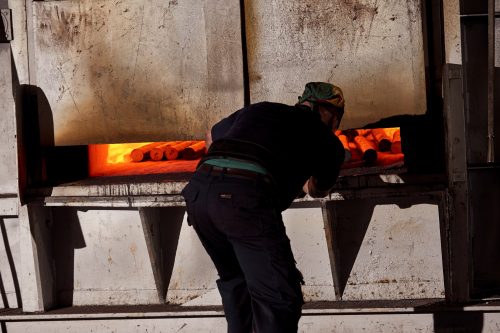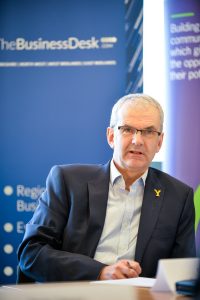Manufacturers prepare for trading dips, inflation, order delays, tariffs and regulations as Brexit looms

Leading manufacturers who work in varying parts of the sector including construction, food, electronics and engineering are facing the reality of preparing for trading dips, inflation costs impacting their customers and forward ordering to mitigate Bexit, which was described by one MD as having the potential to create “choas”.
They discussed the implications of Brexit on their business, and how they are preparing, at the What Yorkshire Is Made Of roundtable jointly sponsored by Grant Thornton and Progeny Corporate Law.
Dips in trading, managing orders and forward buying
Alistair Scott-Somers, director at Progeny Corporate Law, asked whether firms were preparing for a dip in trading because of Brexit. “We think there will be a probably timing gap. We think there will be some

Alistair Scott-Somers
disruption,” responded Gordon Macrae, special projects manager at Sheffield- headquartered Gripple.
“In terms of moving stuff, some customers will actually probably want us to service them early as they have customers to deal with – so there will be some customers who are proactive in Europe, so we will get sales to them early.”
Chris Seymour, MD of William Cook, a firm which operates across the north with bases in Sheffield and Leeds, said a large proportion of the firm’s work is exported, with around half being exported across Europe and a quarter being the rest of the world.
He said: “I do have a lot of concern over the short-term impact of the complete disarray we are in across the country at the moment.”
“Some of our customers have got great plans and have Brexit teams and so their orders are up. Then there are others saying they don’t know what to do and waiting to see what happens.
“It’s difficult for us to plan because we see there is an uplift, and we say ‘is this an extra order or are you going to be taking them out in three months?'”
Seymour said it was hard to plan workforce needs around the volatility. He added: “When a customer has gone quiet, we check that they haven’t gone somewhere else. They say ‘no, we are just waiting because our customers are waiting.’

Chris Seymour
“In the oil division, for example, there are about seven different layers before you get to us. So many things are on hold and it’s a regular occurrence for us with oil price. It’s been the same effect across a broader spectrum of customers in that nobody knows – it’s just that some have put more effort to planning than others. I don’t know what is right.
“It’s irrelevant to the size of the business. There are small businesses panicking and coming up with all sorts of plans and large ones maybe just thinking ‘we call roll with it, we have deep enough pockets.’
“The concern I have is that it’s like the flick of a switch.”
David Hartley, managing director at Wensleydale Creamary, which has a £30m turnover, said the firm supplied most UK retailers and exports to the USA and other countries, but not Europe. However, the company imports products through Europe, including packaging, labels and wax. Hartley said:“We are enjoying growth at the moment but we deal with retailers and that is a very challenging environment.
“We have got the opportunity to radically develop the business in terms of investing in efficiency, locations and supply chain.”
Hartley said Wensleydale Creamery was proactively talking to packaging and ingredients suppliers to try and get their views on how they will manage their process to get the quantity of all materials through.

David Hartley
“We are getting commitment from suppliers to do that and to be fair they have been fairly supportive and proactive. In doing that, it means that we are not being forced to commit to fund buying in extra materials,” he explained.
“But we also have got the American political climate and one of our biggest ingredients is cranberry, which we buy in from the States. Mr Trump, in his wisdom, has asked cranberry suppliers to destroy 25% of the crop to put prices up. So we have got Brexit on one side and Trump on the other. So we have just done a deal to forward buy a lot of cranberries from Canada, which is good.
“The big thing for me on Brexit is the potential for how it effects imported goods for the UK dairy industry.”
Nigel Meredith, managing director of Dual Seal Glass, which doesn’t export because glass is a commodity that doesn’t transport well said his firm spends £6m a year buying in materials from a company in France and has struggled with getting answers from how their supplier will handle the changes. Meredith said: “We are constantly talking to them [about Brexit planning] but they have no idea; they just haven’t got a plan.”

Adam Jackson
Adam Jackson, Brexit Lead for Grant Thornton, said a major concern of businesses was around communicating around the volatility because in “normal times” manufacturers could make assumptions around customer orders and the supply chain.
He said: “Just talking to suppliers and customers more to share what you are doing and understand what assumptions they are making – rather than letting them make their assumptions – is really important. More communication is really important.”
Exporting off the table

Tracey Dawson
Tracey Dawson, managing director at Leeds-based Daletech, one site operation, 30 years old has enjoyed a strong growth trajectory in the last two years. She said: “At the moment, we only work in the UK. Our
further growth was to export but we won’t be – we will be staying in the UK for some time.
“But overall, in our marketplace in the UK, we haven’t seen a downturn at all – to the contrary,” she added.
Preparing while ‘getting on with business’
Simon Pollard of Portakabin, which has a 64-acre site in York, said the firm also had manufacturing sites in France and Germany. He said: ” We have an exceptionally strong business. Brexit, whilst it will come with issues no doubt for everybody, we have our foot either side of the channel which we think should put us in a reasonable place.”
He added that there was concern over getting the steel, as it is bought from Belgium, France and Germany. “Because there is a lot if uncertainty and a lot of scaremongering going on, realistically as a manufacturer one of the only things you can do is make sure you are as good as you can be. You see what comes along and deal with challenges as they arise; beyond that you are guessing.
“We are looking at how good can we be. Let’s concentrate on our competencies and see where the cards fall.”

She added: “There is a real resilience in Yorkshire” and said that firms she knew of were still exporting but not so much in Europe. “It’s more about let’s get our head down and do our job,” said Dawson.
Jackson said: “We do know just how bad the worst could be. The Bank of England describes this as being equivalent to 2008. We didn’t see 2008 coming but we know Brexit is happening and we do know this is possible on 29th of March. Without scaremongering, it is a material risk.
“Yes – focus on getting on with business. But I would challenge the assumption that uncertainty means you can’t or shouldn’t do anything. My stress would be to plan for different scenarios. There is a question as to how much you can put into that.
“By looking at the different models – there are about 3 outcomes or it could be remain – you can work through those. There are some areas where you see the same things happening regardless. I was with a manufacturer recently who was worrying about tariffs, worrying about customers, worrying about administration. They are focused on 29th March because it is looming up, thinking about simplifying customer process, making sure they can handle documentation.
“Anything they do now around customer documentation will stand them in good stead, whatever the outcome.”
Concerns over long-term competitiveness, a focus on quality and benefiting from foreign exchange rates

Gordon Macrae
Gordon Macrae, special projects manager at Sheffield-headquartered Gripple, said the firm had reported a 16% sales uplift and 10% profits rise in the last year and is currently at £76m turnover. The firm employs 750 people worldwide and is employee owned.
Around 85% of its turnover is outside of the UK, 35% is Europe, 40% in America. The business has invested in Japan in the last year, which is a key market for high quality, high labour rates. Macrae added: “You can see than being a £5-£7m turnover business in the next two to three years.
“Long term, competitiveness is a concern. If we are faced with tariffs, that’s bad news,” said Macrae. “That affects our competitiveness but the way we look at that is that if you look at our business, we are global, so you already have to deal with exchange rates and commodity prices – to add tariffs is just another challenge.
“But the way we try to mitigate that is creating products that give us good gross margin. We look at products that will give us 60% gross margin as a starting point. What will then happen is that as the mood changes, that margin will have to flex but we will have to take a long-term view on it,” he added.
Hartley said he was very envious of 60% margins, as in the food industry they are “near to the bone.” He added: “If we end up with a 10% cost increase because of packaging or other ingredients, then we will soon have to pass that along and that’s a message we give to the retailers.”
Meredith, Dual Seal Glass MD, set up the business with his father 24 years ago and manufactures and supplies glass for commercial construction projects.
Based in Huddersfield, the business now employ 150 people and has major contracts such as Wellington Place in Leeds and Headingley Stadium and installations at hospitals, schools and football stadiums. Meredith said: “Most projects we work on are three or four years in the pipeline so the worry is how Brexit is going to affect things past this year.
“At the moment, the construction industry is very challenging. During our last financial year, it was the

Nigel Meredith
worst we have had in company’s history. It improved dramatically in the second half of last year and it is showing signs that next 12 months will be extremely busy – with our order book now 30% busier than it ever has been. For the next 12 months, we are very upbeat.”
Seymour said the foundry sector was a competitive industry operating on a global scale, with large items made regularly. Seymour said: “The Indians, Chinese, Mexicans can make the more simple product at a cost that you can’t even go near. You just move away from those markets.
“We have invested in heavily in technology to make us stand out vs the European foundry’s that we do compete against. We give a positive view to customers that we can make the more difficult parts.”
He said, for example, the firm makes parts for Alstom in Canada that none of US foundry’s can make.“We can get our money out of the fact that we have the higher skills levels and we re-invest. The one benefit from all of this uncertainty – and will give us a lot more benefit – is the foreign exchange benefit. We are suddenly a lot cheaper,” said Seymour.
“A weak sterling not helped us fight against the Indians because it’s impossible as we don’t import a great deal, it’s had a big impact in making us look cheaper. People look for the lowest cost. Sometimes, our product might be better but it’s just too expensive and so they will make a fabricated version of it.
“That’s helped – having a high tech, better product in the fight against lower cost.”

Mark Overfield
Mark Overfield, of Grant Thornton, said: “Post Brexit, a lot of businesses will have the same competitors and ultimately have the same consumers and so as long as you maintain your position in that quality and desirability – that may well play out well.”
Overfield compared the concerns to that of the recession in 2008, stating that there was a “big difference” now as to how business is positioned in manufacturing in the UK. He said that in 2008, it led to businesses making a product could no longer compete with Europe on a cost base.
He added: “Those businesses have gone now. Manufacturers are innovative, and have got to do something different that others can’t do cheaply, otherwise someone else will do it.
“It also led to manufacturing businesses realising they were carrying costs they didn’t need. I think businesses are a lot more efficient now than then. But there is a cautionary element to that – there is now less room for businesses to react than in 2008.”
Consumer choice and inflation
Macrae of Gripple agreed that practical steps could be taken to prepare for Brexit, adding: “Being a typical Yorkshire business, we are quite practical about it. We have looked at what does it really mean?
“It means we won’t be able to get goods to our customers in the timeframe. We offer next day delivery across the UK and Europe. But we now have a plan in place. We have a key business in Strasburg that co-
Hartley said that the UK could not produce the quantity or choice in the marketplace to replace imported goods. He added: “Consumers want that choice. We [the UK] can supply some of those choices but we don’t have a dairy industry that can turn around next week and say ‘don’t worry lads we will do all of that’ because we can’t – we don’t have the technology, we don’t have the wherewithal, we don’t have the milk supply.
“The UK milk market is all about bottled milk, so it’s all about how the diary industry reacts to that, as well as how the food and retail reacts.
“Retailers will say – how do we cope with that level of inflation coming at us? It’s the chaos that could ensue with a no deal Brexit. So as far as I am concerned, the last thing anybody needs is a no deal. We may be able to cope with a no deal Brexit, but the uncertainty that will come for the months of maybe a year will throw a lot of people into chaos.
“When you put it into context, the cheese that you make – you don’t buy the ingredients today, convert it tomorrow and sell it the day after. We put milk down for months and months and months, so that economic uncertainty puts a fair amount of stress on the whole of the dairy industry, not just us– everybody that buys and makes cheese.”
Tariffs and “Looking at the whole business” rather than just reducing costs
Jackson said that the food industry could more impacted by a no deal Brexit than any other. He told the manufacturers that the EU tariffs will apply to UK goods going into the EU if there is no deal. He said: “The 
“Over time, the UK has the choice as to whether they set new tariffs. If you are negotiating with third countries in trade agreements, you are not going to give away your negotiating hand in advance before you have negotiated. On products which the UK doesn’t produce, you can expect tariffs to be very quickly cut,” explained Jackson.
He used the example of tropical fruits, where the EU has high tariffs. On dairy, there will be some protection in place, he said.
Jackson said a lot of businesses were just looking at reducing costs in preparation, to become more efficient, but there were many more things that could be put in place. One aspect he believes businesses can prepare for is absorbing tariffs but added that then there was then a “cumulative effect” to prepare for. He said companies had to budget carefully around the foreign exchange impact, plus the tariff impact, plus the potential for labour shortages leading to increased labour costs.
He added: “There are also customs administration costs. If you are importing and exporting, you are going to have the customs documentation and the paperwork. Looking at the whole thing to asses impact, often you can focus on one area but you have to look at the whole business.”
Jackson added: Looking at people issues, regardless of Brexit the government is going to clamp down on EU immigration. Thinking about how you attract and retain talent applies across the piste. There are common elements regardless of the outcome.”
TheBusinessDesk.com’s What Yorkshire Is Made Of coverage, sponsored by Grant Thornton and Progeny Corporate Law, will be published every day this week and content available on the dedicated Special Report page.









